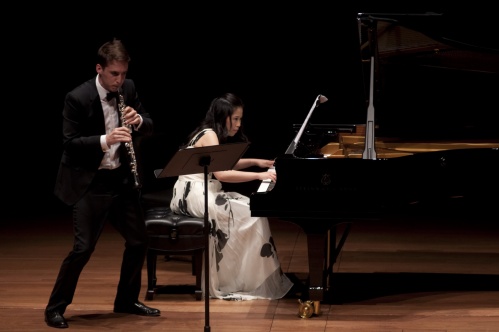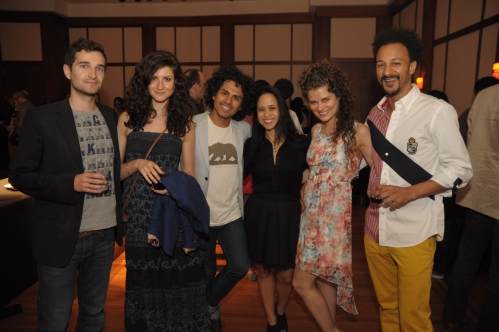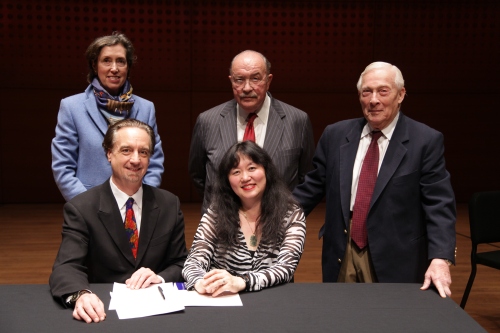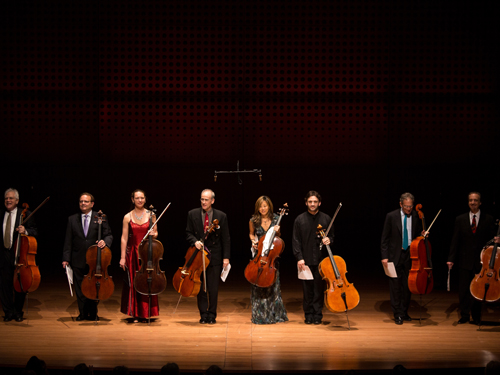
In a single, momentous week in May, David Finckel performed in numerous cities in a variety of roles. Here is his account of seven days, including his various concerts and the definitive, insider’s report on his long-awaited departure from the Emerson String Quartet.
_____________________________
In David’s words
_____________________________
Saturday, May 4 Reneé Fleming in Carnegie Hall
The opportunity to perform in Carnegie Hall is every musician’s dream. I’ve been fortunate to play there many times, and my momentous week began in the Stern Auditorium (the main stage) in a concert belonging to soprano Renée Fleming, who had invited us to appear on the final performance of her Carnegie Hall Perspectives series.
In her intriguing program entitled “Window to Modernity”, she presented music from the transitional period between the Romantic and Modern eras, beginning with late Brahms and exploring music generated from the Second Viennese School. Along with songs by Zeisl, Wellesz, Wagner, and Weigl, we performed Schoenberg’s Transfigured Night with colleagues from our recent recording, Paul Neubauer and Colin Carr. Pianist Jeremy Denk appeared with Renée in various repertoire, and performed two pieces from Brahms’s Op. 118. Renée hosted the concert, speaking about the music to the audience during the many complex stage changes.
At the post-concert reception, the musicians gathered with audience members Ronald Schoenberg and Barbara Zeisl-Schoenberg, the children of the composer. Ronald resembles his famous father very strongly.

Post Concert Party- Left to Right: Ronald Schoenberg, Philip Setzer, Barbara Zeisl-Schoenberg, Reneé Fleming, Eugene Drucker, Jeremy Denk, Lawrence Dutton, David Finckel
Sunday, May 5: The Trio plays in Montreal
The next morning, Philip Setzer, Wu Han and I left early for the Ladies Morning Musical Club series in Montreal. A longtime venue for the Emerson Quartet, and more recently our trio, we were welcomed for our second appearance that included performances of Haydn’s A major Trio, Dvorak’s “Dumky” Trio, and Mendelssohn’s d minor Trio.
Artists who perform for this series, which is held in the wonderful Pollack concert hall at McGill University, are always treated to the best of care and feeding.

Left to Right: David Finckel, Monique Prévost, Philip Setzer, Michèle Nepveu, Wu Han
As the concert ended by 5 p.m., we managed to return to New York that same evening.
Monday, May 6: First rehearsal with Paul Watkins, Greene Space performance, CMS gala
After meetings which began at 8:00 a.m. and ran until lunchtime, Wu Han and I welcomed Gene, Phil, Larry and my Emerson Quartet successor Paul Watkins to our newly-expanded living room to rehearse the Schubert Cello Quintet. We were performing the Quintet at both the Chamber Music Society gala that night, and for my final concert with the Quartet the following Saturday.
The last time the quartet had rehearsed in our old apartment, it looked like this:

And by April, it looked like this:

It was the first time we got a look at the new ESQ.

The rehearsal was wonderful: intense, musical, friendly, joyful and celebratory.


Unbelievably, between our rehearsal and performance for the CMS gala, the Quartet raced down to WQXR’s Greene Space performance and broadcast venue for an hour-long, live streamed interview and concert, hosted by Jeff Spurgeon and produced by Martha Bonta. The quartet was joined by cellist Colin Carr and violist Paul Neubauer, who graciously agreed to play with us to promote our about-to-be-released CD “Journeys”, featuring string sextets by Schoenberg (Transfigured Night), and Tchaikovsky (Souvenir of Florence.)

A video of the performance can be found here.
After the performance and interviews, we were whisked past a throng of enthusiastic Emerson fans who had turned out to see my last public performance with the quartet in New York, into a van for a swift trip to the St. Regis Hotel, site of the CMS spring gala.
The room at the St. Regis is elegant and held 26 tables purchased by patrons and CMS board members, each of whom invited their own guests. Our gala chairs were James and Melissa O’Shaughnessy, Joan Harris, Elizabeth Smith, and Erwin and Pearl Staller, and the room was filled with an international collection of Emerson Quartet fans who had turned out to honor the quartet, past, present and future, some coming from as far away as Seoul, Korea.

Within minutes of our arrival, we walked onto the stage to perform the Schubert Quintet, Paul Watkins taking his first bow as the incoming cellist of the Quartet.

After the performance, which was rewarded with a thunderous ovation, the speeches began. We received gifts from Peter Frelinghuysen, Chairman of the Board, and the five us posed for our first picture together in public.


I then took the lectern to speak, paying tribute to the quartet from CMS, and, from the perspective of the Emerson, thanking CMS for its support over the years and the evening’s honor.

Having donned both CMS and ESQ hats during my dual-role remarks (much to the amusement of the guests) I concluded by officially welcoming Paul to the Quartet and crowning him with the ESQ hat.

The event was a stunning success, raising a hefty sum for CMS and providing the quartet and our families – all of whom attended – with an elegant and heartwarming occasion in which to celebrate the Quartet’s many accomplishments and exciting future.
Tuesday, May 7: The Quartet’s last tour performance, Buffalo, NY
Rising early after a late night with the Chamber Music Society, the four of us left for Buffalo to perform our last full quartet concert together. Fittingly, it was on one of America’s most hallowed chamber music series, which this year celebrates its 90th anniversary. We have appeared on this distinguished series many times, and our audience in this quartet-focused town has often included musical luminaries and mentors, such as Budapest Quartet cellist Mischa Schneider way back in the 1981-82 season.
Upon arriving in Buffalo, we learned almost immediately that the Buffalo Philharmonic was to play in Carnegie Hall the following evening as part of the Spring for Music orchestral festival. The city was immensely proud, with signage everywhere congratulating the orchestra on its coming appearance.

The Buffalo concert encapsulated many of the realities of heavy touring: Early flights for all; a lengthy, in-studio radio interview for me immediately on arrival; some crammed practicing in the hotel; an even more hectic rehearsal in which we prepared not only for Buffalo but for Washington’s concert; a very difficult program which included my last performances of Berg’s Lyric Suite, Dvorak’s d minor quartet, and Mozart’s quartet K. 499 in front of a discriminating audience; and finally, a post-concert trek back to the hotel for some Buffalo chicken wings for dinner.
Wednesday, May 8: CMS at the Harris Theater, Chicago
While my colleagues returned home to New York, I hurried to Chicago for the final performance of the Chamber Music Society’s annual series at Harris Theater. Beginning last year, the series has proved a stunning success, and our partnership with the theater has just been extended for another three seasons.
We were very proud to bring to Chicago the Society’s first all-Britten program, celebrating the 100th anniversary of the composer’s birth and the first such program in the history of CMS. On the program were Britten classics and novelties, including many extraordinary works composed at the beginning of his career. Of musicians featured were the Orion String Quartet, oboist James Austin Smith, pianist Gloria Chien, tenor Anthony Dean Griffey, countertenor Daniel Taylor, and me and Wu Han, who concluded the concert with Britten’s Sonata in C of 1961, composed for cellist Mstislav Rostropovich. I played the sonata for Rostropovich when I was in my mid-teens; one of the many rare opportunities I have had to play for musicians to whom composers dedicated their works to.

Cellist Tim Eddy

Canticle II: Abraham and Isaac for Countertenor, Tenor, and Piano, Op. 51

Phantasy Quartet for Oboe, Violin, Viola, and Cello, Op. 2
After the concert, which was attended by over 800 wildly enthusiastic patrons, we were graciously treated to a relaxed dinner in the stunningly beautiful home of Joan Harris.

Joan Harris, center
Thursday, May 9: A special rehearsal and another important gala
Upon our return to New York the next day on yet another early flight, we welcomed the eminent pianist Menahem Pressler to our home for lunch and a rehearsal with Wu Han. Next season, Menahem, the pianist of the Beaux Arts Trio for more than fifty years, celebrates his 90th birthday with special concerts in some of the world’s most distinguished venues. The Chamber Music Society will honor him with a concert in December, where he will be joined by Wu Han, violinist Daniel Hope, myself, and the new Emerson Quartet. And earlier, in November, Wu Han flies to Paris to join Menahem as a four-hand partner at the Salle Gaveau. I was treated to the sounds of their Schubert as I worked in my office.

After they finished, I invited Menahem to witness a poignant, personal moment in my career. While organizing my music for the coming weekend, I found that my concert binder contained only three more works that I would play with my quartet – quite a reduction from the usual thirty to forty pieces that the quartet has carried annually for so many years. But I was heartened to be able to beef up this collection with the music of my new future – trios, solo works, and a variety of wonderful chamber pieces that I will play within the next month. And once again, my concert folder felt heavy and full again, to the delight of both of us.

With hardly a break, Wu Han and I dressed up to look our best and headed off for an important Lincoln Center event: the annual Lincoln Center gala, honoring the President of Lincoln Center, Reynold Levy, who will step down in December after eleven years of service. During his tenure, he has raised well over a billion dollars for Lincoln Center, and has overseen the mammoth redevelopment of the campus, which included the stunning renovation of our own Alice Tully Hall in its initial phase. Lincoln Center, and indeed all of New York, owes Reynold incalculable gratitude, and we were more than proud to have been invited to this event personally by him. The Chamber Music Society made us proud to have purchased a table, which was well stocked with our prominent board members, and we were more than thrilled to be seated by Reynold with his close friend, Lincoln Center board member Bart Friedman, former Ambassador to China, Winston Lord, and his wife, novelist Bette Bao Lord, and United States Ambassador to the United Nations, Susan Rice.

Lincoln Center Board Chair Katherine Farley welcomes Reynold Levy to the stage
We were also delighted to have a brief but ecstatic moment with two people whom we deeply admire, and who we are now privileged to count among our good friends: Ric Scofidio and Elizabeth Diller, the brilliant architects who re-imagined Lincoln Center to universal acclaim, and who have just been announced as the winning architects for the coming MoMA re-design.
Friday, May 10: Rehearsals, teaching and the CMS Britten Centennial concert
Friday morning was spent in our gorgeous, and I believe now-incomparable, Alice Tully Hall. I personally have not heard a chamber hall in the world, especially of that size (900-1000 seats) with such extraordinary acoustics. And what a pleasure to hear the amazing music of Benjamin Britten in it, with all its ingenious details and vibrant colors so clearly and compellingly heard.

In between rehearsal and concert I spent some serious time at the Juilliard School, meeting with the administration and coaching some ensembles. Next year I will be able to gradually increase my teaching availability, and I am already wondering how I can possibly take on the six chamber ensembles that have asked me to work with them during the fall semester.
That evening we repeated the Chicago program, and once again, the large audience responded with the kind of excitement that presenters dream of – especially for programs of 20th century music. Our capping of the program with the Sonata was a personal highlight of our year, and a great way for us to finish our performances for the CMS 2012-13 season. Although I am usually not one to talk about reviews, I cannot help but mention the three raves this program received in Chicago, and the rare stamp of complete approval from the New York Times.

After the concert, there was a party for members of CMS Now, a membership program for young professionals created by CMS Director of Marketing Lauren Bailey. Approximately 100 young listeners jammed the Rose Studio to spend some relaxed, quality time together, imbibing wonderful wines and spirits provided by Warwick Vineyards and event sponsor The L Magazine.
Saturday, May 11: Packing for a long trip, a cello recital, a train trip, my final Emerson concert
After a short night, we were up early to pack for our upcoming trip to California, then Korea. I was at the Juilliard School at 8:30am to hear the dress rehearsal of my cello student, Sarina Zhang, in Paul Recital Hall. Sarina has graduated with distinction from Juilliard Pre-College and will continue her cello studies next year at the college with Richard Aaron and myself, and her piano studies with Yoheved Kaplinsky.
After some brief work in the CMS office (which is a 60-second walk from the Juilliard School) I returned at 11 a.m. to Paul Hall to hear Sarina and her pianist Carlos Avila perform Beethoven’s Sonata in C major, and to hear Sarina play two fiendishly difficult unaccompanied pieces by Joel Friedman. Unfortunately I had to miss her Chopin Sonata with pianist Jun Cho because I had to catch the 12:05 p.m. train to Washington.
My last trip to Washington was the beginning of my historic end of days with the Emerson Quartet. Traveling with my family, I was filmed wistfully looking out the window, and working on the short speech that I would deliver at the concert. Upon arriving in Washington, Wu Han raced off to the WETA station for an interview, and I plunged into my last rehearsal, ever, with the Emerson String Quartet. It was a bit strange, I’ll admit, and at the conclusion of it, we all went our separate ways, perhaps somewhat wary of confronting the reality of the moment.
We have enjoyed an annual series at the Smithsonian for thirty-five years, which began one year before I joined the quartet. There could not have been a more fitting place for me to say goodbye to the quartet.
The backstage scene at the Natural History Museum’s Baird Auditorium was very different than usual. American Public Media came all the way from Minnesota to record the concert, bringing with them their star announcer, our long-time friend Fred Child. I have done more interviews with Fred than I can remember, but they have always been memorable, enjoyable and intelligently conceived. It is a privilege to be welcomed to the airwaves, and now the internet, by such a virtuoso media personality.

Wu Han with Fred Child
After a brief introduction by incoming Smithsonian Resident Associates Director Frederica Adelman, and Fred Child, the Emerson took the stage for a somewhat nerve-wracking performance of Haydn’s Quartet Op. 20 No. 4. I’m not sure if my colleagues felt the same way, but I was mostly concerned with not making a mess of my last Haydn Quartet, and thoughts of the significance of the moment and the sentimentality potentially attached to it, found little room in my brain. The Haydn began and ended without significant incident that I can remember, and we plunged into the frenetic and breathless Bartok 3rd quartet, which, I daresay, went as well or better than it ever has, at a fever pitch, and all the more so because we didn’t have the chance to rehearse a note of it. It continues to mystify me how this works, but quite often in classical music, rehearsals often complicate matters, especially when an ensemble already knows a piece quite well. I think we were all rather amazed.

Fredrica Adelman
During the intermission I spoke with Fred Child, who asked the inevitable “How are you feeling right about now?” question, and I responded the best I could.
And then came the moment the music world had been waiting well more than a year for: the transition from me to Paul via the immortal Schubert Quintet for string quartet with an extra cello. Before we began, I said a few words, and as I had written them out, I’ll share them right here:
I have two thank you’s and two tributes and I will be brief:
- Thanks to Smithsonian Institution – for providing us a home in which we grew, a unique place where we have played more concerts than any other, and likely performed every quartet that we have ever learned.
- And thanks to you, our audience tonight, composed of many who have come a great distance to be with us, and those of you who have been with us for many concerts, like Carl Girshman, Carl, where are you and what number Emerson concert is this for you?
And now two quick tributes: to my colleagues Phil, Gene and Larry for having had the courage and imagination to re-envision the future of the Emerson Quartet, and
to Paul Watkins, my brilliant successor, for making that exciting future possible.
Please enjoy the concert, and thank you very much.

David speaks from stage.
The performance of the Schubert was everything I had hoped for. Paul played magnificently; his energy, excitement and artistry permeated the ensemble and the entire room. The Smithsonian public welcomed him with open arms, and the warmth of the event allowed me to leave the hall with a sense that all I had helped to build there will continue with strength and conviction.


But the night was not over. Running to our various cars in a drenching rain, the Emerson Quartet and its families headed to Chevy Chase where an intimate party was given at the home of close friends Rob Josephs and Gerri Carr, co-hosted by Kathe and Edwin Williamson.

Rob and Gerri, left
The party went quite late, there were speeches, and I was presented by the quartet with a beautiful gold watch which they had purchased in the Bavarian town of Badenweiler earlier this year, on the occasion of my last concert there. The inscription reads: “To David, the ESQ Time Meister ‘It was the best of times’ With love and admiration Phil, Gene and Larry”

Way too late, the members of the Emerson Quartet, new and old, headed off into their new lives. For me, Phil and Wu Han, it was another early flight the next morning, to California, where we concluded Music@Menlo’s Winter Series with a trio concert. And the next day, it was off to Korea on a long flight, which thankfully has given me the time to complete this very long blog about this week – one certainly like no other.
A partial list of people who journeyed considerable distances to be with the Emerson Quartet during the transitional week:
Bill and Valerie Graham, Charlotte, VT
Marty and Sarah Flug, Aspen, CO
Jeehyun Kim, Seoul, Korea
Judith Barnard and Michael Fain, Aspen, CO
Joan Harris, Chicago, IL
Robert and Diana Hardy, St. Louis, MO
Ben Larsen, New York, NY
Harold & Jann Slapin, Basking Ridge, NJ
Irvine and Elizabeth Flinn, New York, NY
Freddie and Irwin Staller, NY
Harvey and Alisa Eisenberg, Newport Beach, CA
Robert and Shirley Kenny, Richmond, VA
Margaret and Da-Hong Seetoo, Forest Hills Gardens, NY
Matthew Zelle, New York, NY (IMG Artists)
Linda Petrikova, New York, NY (IMG Artists)
Shirley Kirshbaum, New York, NY (Kirshbaum/Demler Associates)
Susan Demler, New York, NY (Kirshbaum/Demler Associates)
Milina Barry, New York, NY (Milina Barry PR)
… and our family members
Margaret Lim (Boston, MA)
Kim Lim (New York, NY)
Jesse, Luke, Sam Dutton and Elizabeth Lim-Dutton (Bronxville, NY)
Linda Setzer (South Orange, NJ)
Katia Setzer (Philadelphia, PA)
Wu Han (New York, NY)
Lilian Finckel (New York, NY)

Alisa Eisenberg, Margaret Seetoo, Harvey Eisenberg, Irvine Flinn

Efrem and Michael Calingaert, Eugene Drucker, Diana Hardy

Kim Lim, Efrem and Michael Calingaert, Philip Setzer

Emerson Quartet group hug

Emerson Quartet group hug.




